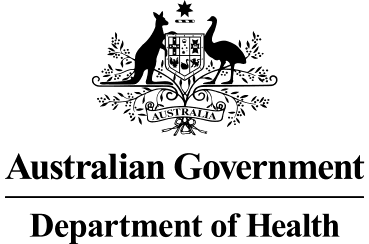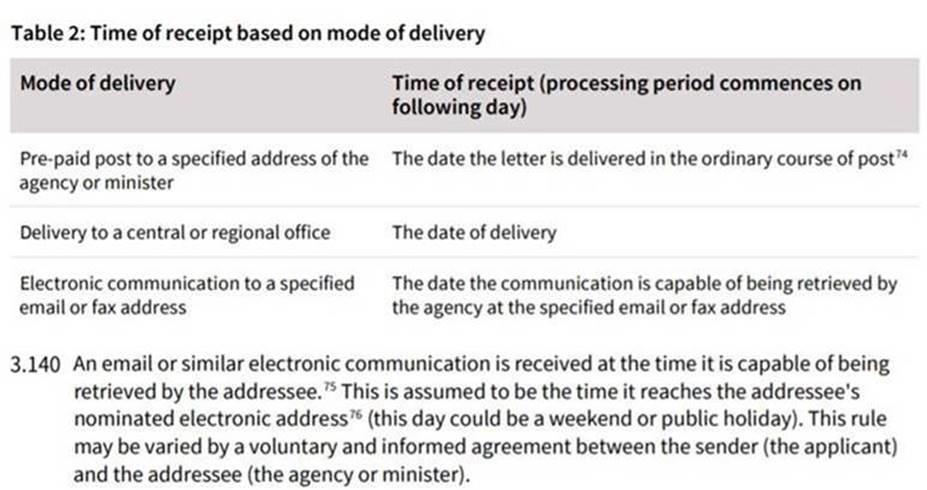
Department References: FOI 2917
Mr James Nugent
via email
: xxxxxxxxxxxxxxxxxxxxxxxxx@xxxxxxxxxxx.xxx.xx
Dear Mr Nugent
NOTICE OF DECISION – FREEDOM OF INFORMATION
INTERNAL REVIEW OF DECISION TO IMPOSE CHARGES
I refer to your request to the Department of Health (the department) seeking access
under the
Freedom of Information Act 1982 (the FOI Act) to the following documents:
any information on the probabilities that were considered in formulating the
updated recommendation on 24 July that 'All individuals aged 18 years and
above in greater Sydney, including adults under 60 years of age, should strongly
consider getting vaccinated with any available vaccine including COVID-19
Vaccine AstraZeneca.'
In particular, what information did ATAGI consider in relation to the probability
of:
- developing TTS,
- death after developing TTS,
- catching covid before being vaccinated with AstraZeneca,
- catching covid after being vaccinated with AstraZeneca, and
- death after catching covid?
Internal review – Charge
On 1 October 2021, you requested the department waive the processing charge on
the grounds of public interest, and you provided the following information in
support of your request for waiver.
I contend the charge should not be imposed on the basis of section 29(5)(b) of the
FOI Act - that access to the document in question is in the general public interest
or in the interest of a substantial section of the public. This is manifest, but if you
need examples of public interest in this topic these articles should suffice:
-
https://www.abc.net.au/news/2021-09-25/low-mortality-rate-astrazeneca-
covid-vaccine-clots-tts/100489408
-
https://theconversation.com/yes-you-can-still-get-covid-after-being-
vaccinated-but-youre-unlikely-to-get-as-sick-163870
-
https://www.afr.com/politics/how-to-halve-the-death-rate-from-covid-19-
20210820-p58kih
-
https://www.theaustralian.com.au/science/only-real-options-are-vaccination-
or-risk-death-by-delta/news-story/8ade3ec715c5fdd88694534c2d251ecc
Internal Review Decision
I am authorised under subsection 23(1) of the FOI Act to make decisions in relation
to FOI requests, including requests for internal review of charges decisions.
I am writing to notify you of my decision in response to your request for internal
review of the department’s decisions to impose charges in relation to your FOI
request.
I have decided to waive the charge in relation to your FOI request.
Information taken into account
In making my decision, I had regard to the following:
• the scope of your request
• the content of the documents identified as falling within scope of your
request
• your contentions in your email of 1 October 2021 that the charge should be
waived
• advice from departmental officers with responsibility for matters relating to
the documents sought
• information received from the Office of the Australian Information
Commissioner (OAIC)
• the relevant provisions of the FOI Act and the FOI Charges Regulations,
and
• the Guidelines issued by the OAIC under section 93A of the FOI Act (the
FOI Guidelines).
Grounds for reducing or waiving the charge
Subsection 29(5) of the FOI Act requires a decision maker, in deciding whether or not
to waive or reduce the charges, to take into account:
• whether paying the charge would cause financial hardship to the applicant,
and
• whether giving access to the documents is in the general public interest or
in the interest of a substantial section of the public.
Subsection 29(5) of the FOI Act does not limit the matters an agency may consider in
making a decision on whether to impose or waive a charge.
My findings of fact regarding reduction of waiver of the charge on the grounds of
public interest, financial hardship and other considerations are set out separately
below.
Public Interest
You have contended that the charges should be waived on public interest grounds,
and have provided links to articles in which issues related to your FOI request have
been canvassed.
There is a difference between something that is ‘in the public interest’ and something
that is ‘of interest to’ the public or some members of the public. For example, many
issues that attract media attention and community interest have no bearing in the
good order and functioning of the community and government affairs or the
wellbeing of citizens.
Paragraphs 4.105 to 4.107 of the FOI Guidelines relevantly provide as follows:
The FOI Act requires an agency or minister to consider ‘whether the giving of
access to the document in question is in the general public interest or in the
interest of a substantial section of the public’ (s 29(5)(b)). This test is different to,
and can be distinguished from, public interest considerations that may arise
under other provisions of the FOI Act.
Specifically, the public interest in s 29(5)(b) is different to the public interest test
in s 11A(5) that applies to conditionally exempt documents. Nor will s 29(5)(b)
be satisfied only by a contention that it is in the public interest for an individual
with a special interest in a document to be granted access to it, or that an
underlying premise of the FOI Act is that transparency is in the public interest.
An applicant relying on s 29(5)(b) should identify or specify the ‘general public
interest’ or the ‘substantial section of the public’ that will benefit from this
disclosure (s 29(1)(f)(ii)). This may require consideration of both the content of
the documents requested and the context in which their public release would
occur. Matters to be considered include whether the information in the
documents is already publicly available, the nature and currency of the topic of
public interest to which the documents relate, and the way in which a public
benefit may flow from the release of the documents.
In addition, paragraph 4.97 of the FOI Guidelines provides as follows:
Moreover, an agency or minister should always consider whether disclosure of a
document will advance the objects of the FOI Act, even if the applicant has not
expressly framed a submission on that basis. The objects of the FOI Act include
promoting better informed decision making, and increasing scrutiny, discussion,
comment and review of the Government’s activities (s 3).
I am therefore satisfied that the charge should not be waived or reduced on public
interest grounds.
Please note that my decision on public interest goes only to the question of whether
the charges should be imposed, and not to the issue of whether any relevant
documents should ultimately be disclosed.
Financial hardship
You have not raised the issue of financial hardship or provided evidence to indicate
that payment of the charge would cause you financial hardship.
I find that the charge should not be waived or reduced on the grounds of financial
hardship.
Other considerations
Subsection 29(5) of the FOI Act does not limit the matters an agency may consider in
making a decision on whether to impose or waive a charge. Having taken other
matters I consider relevant to your request into account, I have decided to waive the
charge on this occasion.
I understand you sent your FOI request to an email address listed on the ‘Right To
Know’ website. Right to Know is a private entity that is not affiliated with the
department and is not authorised to provide information or advice to individuals
about the process for making FOI requests to the department or other
Commonwealth entities.
I have taken into account the delay in the commencement of processing of your FOI
request resulting from your reliance on the incorrect information on the Right To
Know website.
For your information and future reference, section 15 of the FOI Act sets out the
requirements for making a valid FOI request, and subsection 15(2A) lists the ways in
which an FOI request can be submitted to a Commonwealth entity.
Subsection 15(2A) of the FOI Act is in the following terms:
The request must be sent to the agency or Minister. The request may be sent in any of
the following ways:
(a) delivery to an
officer of the
agency, or a member of the staff of the
Minister, at the address of any central or regional office of the
agency or
Minister specified in a current telephone directory;
(b) postage by pre-paid post to an address mentioned in
paragraph (a);

(c) sending by
electronic communication to an electronic address specified by
th
e agency or Minister.
Consistent with this legislative requirement, the FOI Guidelines published by the
OAIC provide as follows:
The department’s FOI internet page provides information about making FOI
requests to the department, including information about how to submit an FOI
request and the FOI Unit’s contact details. The internet page also includes a link to
an FOI application form for those who wish to use it:
https://www.health.gov.au/about-us/corporate-reporting/freedom-of-
information-foi
The nominated email address for sending an FOI request to the department by
electronic communication, as set out on the department’s website and in the
department’s FOI application form, is via the email address
xxx@xxxxxx.xxx.xx. The
department monitors this email box daily to ensure FOI related requests and queries
are actioned as soon as possible, consistent with statutory timeframes set out in the
FOI Act.
I understand you sent your FOI request to an ATAGI email address. The officers
with access to that email box are working on high priority issues, including the
government’s ongoing response to the current pandemic. As a result, your email
was not actioned for several weeks.
Processing of your FOI request was delayed until the FOI Unit received your request
on 23 August 2021 at the email address nominated by the department in accordance
with subsection 15(2A) of the FOI Act.
Effect of my decision
As a consequence of this decision, you are not liable to pay the charge imposed in
relation to your FOI request.
In addition, the timeframe for providing a decision in response to your FOI request
recommences on the day you receive this decision.
FOI review rights
If you are dissatisfied with my decision, under section 54L of the FOI Act, you may
apply to the OAIC for review of my decision by the Information Commissioner (IC).
In accordance with subsection 54S(1) of the FOI Act, an IC review application in
relation to a decision covered by subsection 54L(2) (access refusal decisions) must be
made in writing within 60 days after the day you are notified of this internal review
decision.
More information about IC review is available on the OAIC website at:
https://www.oaic.gov.au/freedom-of-information/reviews/
The OAIC can be contacted by:
Email:
xxxxxxxxx@xxxx.xxx.xx
Phone:
1300 363 992
Complaints
If you are dissatisfied with actions taken by the department, you may also make a
complaint.
Complaint to the department
Complaints to the department are covered by the department’s privacy policy. A form
for lodging a complaint directly to the department is available on the department’s
website:
https://www.health.gov.au/about-us/contact-us/complaints Complaint to the IC
Information about making a complaint to the IC about action taken by the
department is available on the OAIC website:
https://www.oaic.gov.au/freedom-of-information/reviews-and-complaints/make-
an-foi-complaint/
Relevant provisions under the FOI Act
The FOI Act and the FOI Charges Regulations, including the provisions referred to
in this letter, can be accessed from the Federal Register of Legislation websites:
https://www.legislation.gov.au/Details/C2021C00219
https://www.legislation.gov.au/Details/F2019L00348 Contacts
If you require clarification of any of the matters discussed in this letter, you should
contact the Freedom of Information Unit at
xxx@xxxxxx.xxx.xx. Yours sincerely
Stephen Bouwhuis
General Counsel
Legal Advice and Legislation
11 October 2021


